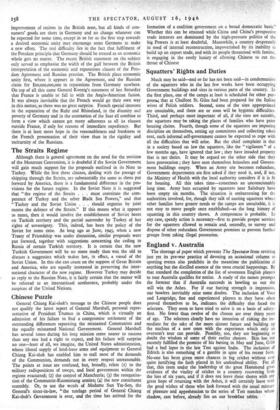Chinese Puzzle
General Chiang Kai-shek's message to the Chinese people does not qualify the latest report of General Marshall, personal repre- sentative of President Truman in China, which is virtually an admission of his failure to find a compromise settlement of the outstanding differences separating the misnamed Communists and the equally misnamed National Government. General Marshall has several times during his long mission come nearer to success than any one had a right to expect, and his failure will surprise no one—least of all, we imagine, the United States administration, whose liberal supply of lend-lease arms and equipment to General Chiang Kai-shek has enabled him to stall most of the demands of the Communists, demands not in every respect unreasonable. The points at issue are confused, but, broadly, relate (t) to the military redispositions of troops, and focal government within the regions evacuated; (2) the control of Manchuria; (3) the reorganisa- tion of the Communist-Kuomintang armies; (4) the new constituent assembly. Or, to use the words of Madame Sun Yat-Sen, the General's sister-in-law, "the tutelage period of General Chiang Kai-shek's Government is over, and the time has arrived for the
formation of a coalition government on a broad democratic basis." Whether this can be attained while China and China's prospective trade interests are dominated by the high-pressure politics of the big Powers is at least doubtful. Meanwhile, a country desperately in need of internal reconstruction, impoverished by its inability to build up an export trade, and with its people threatened with famine, is engaging in the costly luxiny of allowing Chinese to cut the throat of Chinese


























 Previous page
Previous page